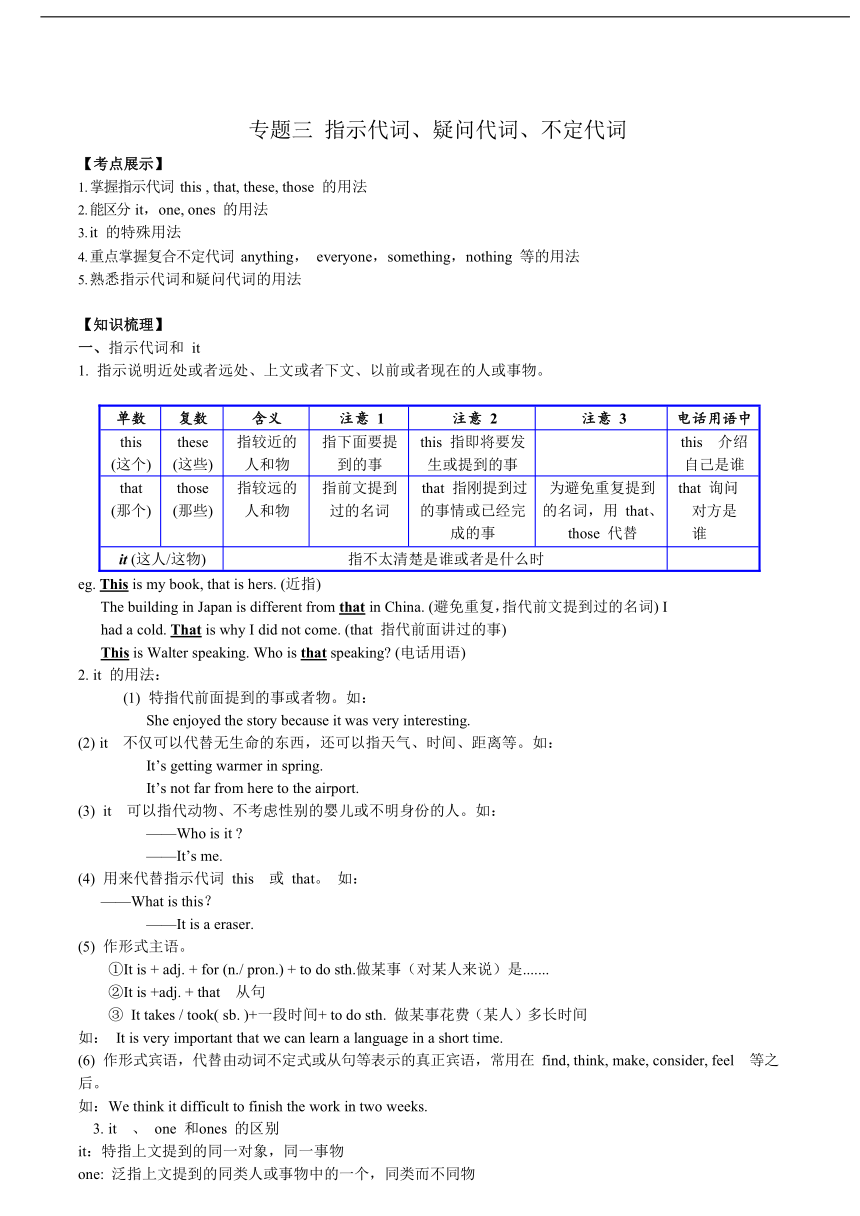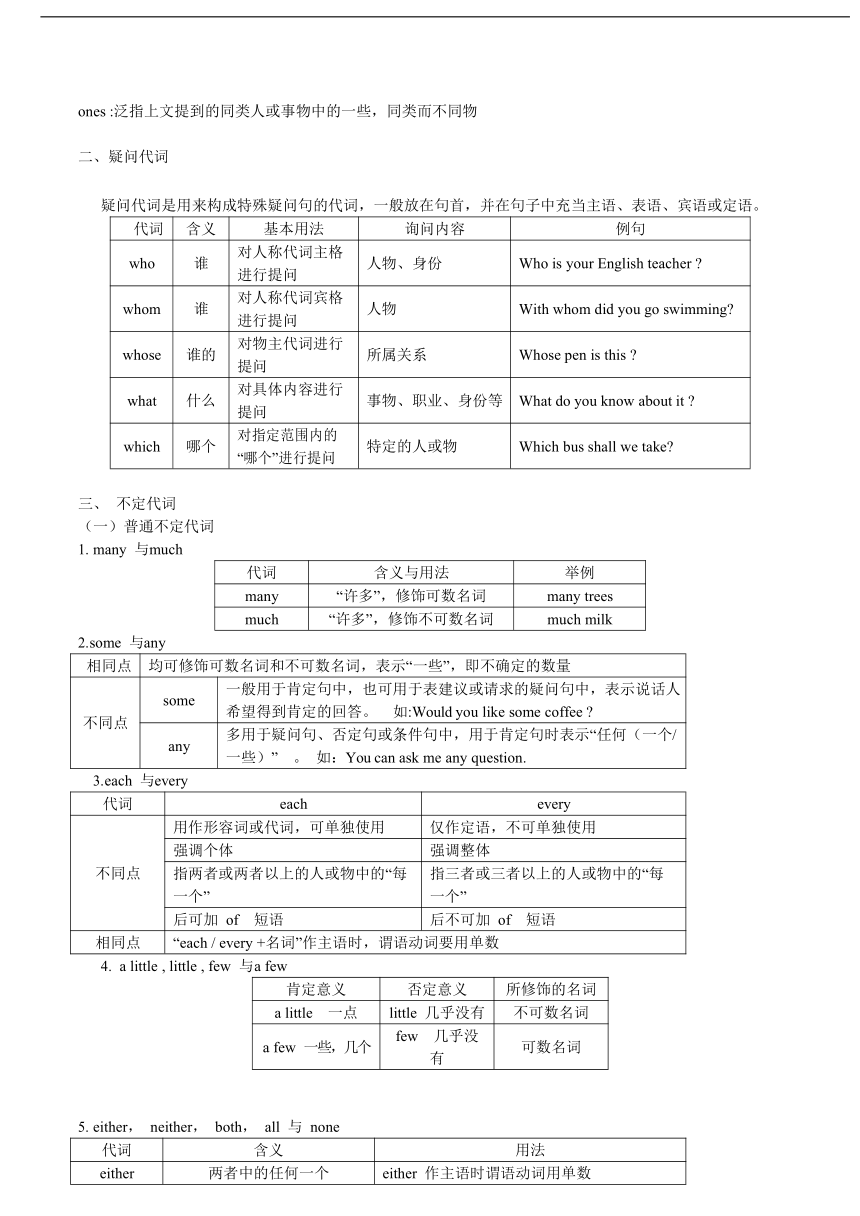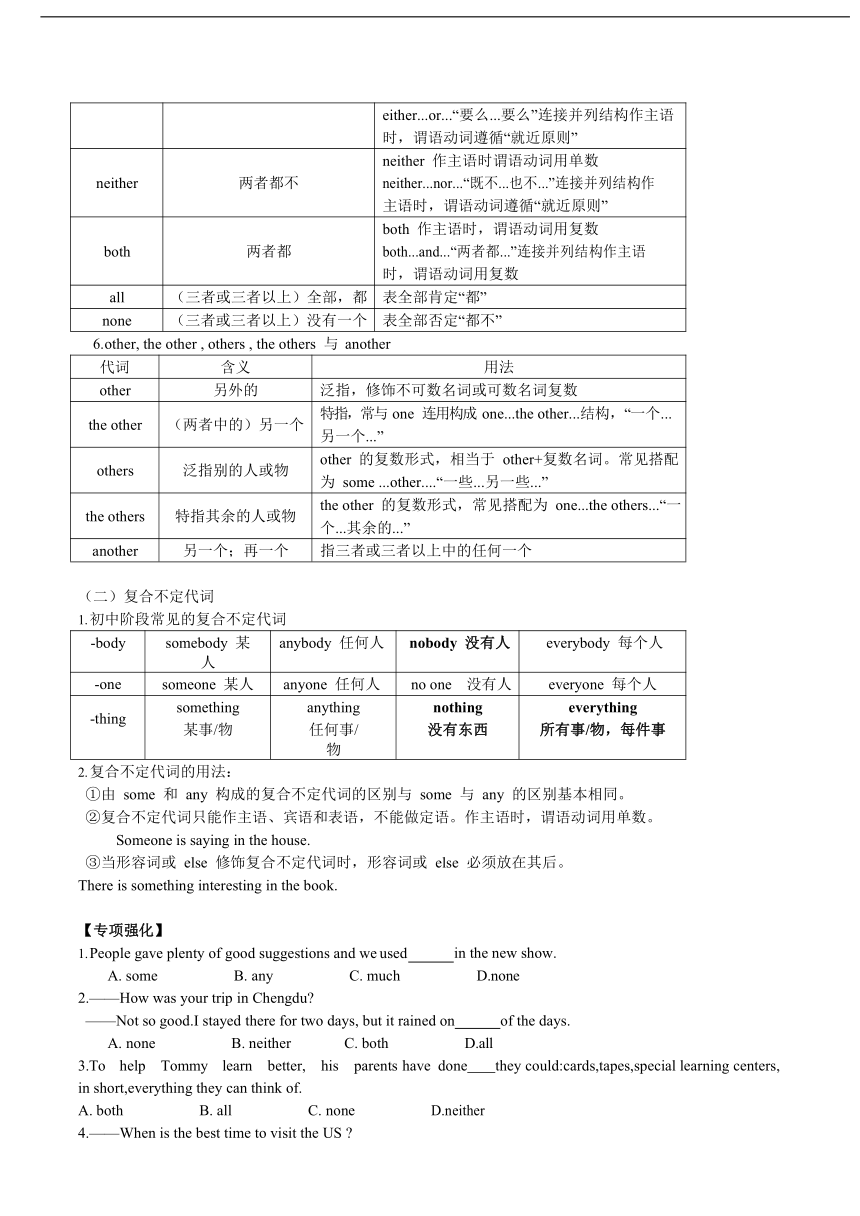2022暑假仁爱版英语八年级下册 专题三 指示代词、疑问代词、不定代词 讲义(无答案)
文档属性
| 名称 | 2022暑假仁爱版英语八年级下册 专题三 指示代词、疑问代词、不定代词 讲义(无答案) |  | |
| 格式 | docx | ||
| 文件大小 | 44.5KB | ||
| 资源类型 | 教案 | ||
| 版本资源 | 仁爱科普版 | ||
| 科目 | 英语 | ||
| 更新时间 | 2022-06-28 14:55:53 | ||
图片预览



文档简介
专题三 指示代词、疑问代词、不定代词
【考点展示】
掌握指示代词 this , that, these, those 的用法
能区分 it,one, ones 的用法
it 的特殊用法
重点掌握复合不定代词 anything, everyone,something,nothing 等的用法
熟悉指示代词和疑问代词的用法
【知识梳理】
一、指示代词和 it
指示说明近处或者远处、上文或者下文、以前或者现在的人或事物。
单数 复数 含义 注意 1 注意 2 注意 3 电话用语中
this (这个) these (这些) 指较近的 人和物 指下面要提 到的事 this 指即将要发 生或提到的事 this 介绍 自己是谁
that (那个) those (那些) 指较远的人和物 指前文提到过的名词 that 指刚提到过 的事情或已经完成的事 为避免重复提到 的名词,用 that、those 代替 that 询问对方是谁
it (这人/这物) 指不太清楚是谁或者是什么时
eg. This is my book, that is hers. (近指)
The building in Japan is different from that in China. (避免重复,指代前文提到过的名词) I had a cold. That is why I did not come. (that 指代前面讲过的事)
This is Walter speaking. Who is that speaking (电话用语)
it 的用法:
特指代前面提到的事或者物。如:
She enjoyed the story because it was very interesting.
it 不仅可以代替无生命的东西,还可以指天气、时间、距离等。如:
It’s getting warmer in spring.
It’s not far from here to the airport.
it 可以指代动物、不考虑性别的婴儿或不明身份的人。如:
——Who is it
——It’s me.
用来代替指示代词 this 或 that。 如:
——What is this?
——It is a eraser.
作形式主语。
①It is + adj. + for (n./ pron.) + to do sth.做某事(对某人来说)是.......
②It is +adj. + that 从句
③ It takes / took( sb. )+一段时间+ to do sth. 做某事花费(某人)多长时间如: It is very important that we can learn a language in a short time.
作形式宾语,代替由动词不定式或从句等表示的真正宾语,常用在 find, think, make, consider, feel 等之后。
如:We think it difficult to finish the work in two weeks.
it 、 one 和 ones 的区别
it:特指上文提到的同一对象,同一事物
one: 泛指上文提到的同类人或事物中的一个,同类而不同物
ones :泛指上文提到的同类人或事物中的一些,同类而不同物二、疑问代词
疑问代词是用来构成特殊疑问句的代词,一般放在句首,并在句子中充当主语、表语、宾语或定语。
代词 含义 基本用法 询问内容 例句
who 谁 对人称代词主格 进行提问 人物、身份 Who is your English teacher
whom 谁 对人称代词宾格 进行提问 人物 With whom did you go swimming
whose 谁的 对物主代词进行 提问 所属关系 Whose pen is this
what 什么 对具体内容进行 提问 事物、职业、身份等 What do you know about it
which 哪个 对指定范围内的 “哪个”进行提问 特定的人或物 Which bus shall we take
三、 不定代词
(一)普通不定代词
many 与 much
代词 含义与用法 举例
many “许多”,修饰可数名词 many trees
much “许多”,修饰不可数名词 much milk
some 与 any
相同点 均可修饰可数名词和不可数名词,表示“一些”,即不确定的数量
不同点 some 一般用于肯定句中,也可用于表建议或请求的疑问句中,表示说话人 希望得到肯定的回答。 如:Would you like some coffee
any 多用于疑问句、否定句或条件句中,用于肯定句时表示“任何(一个/ 一些)” 。 如:You can ask me any question.
each 与 every
代词 each every
不同点 用作形容词或代词,可单独使用 仅作定语,不可单独使用
强调个体 强调整体
指两者或两者以上的人或物中的“每 一个” 指三者或三者以上的人或物中的“每 一个”
后可加 of 短语 后不可加 of 短语
相同点 “each / every +名词”作主语时,谓语动词要用单数
a little , little , few 与 a few
肯定意义 否定意义 所修饰的名词
a little 一点 little 几乎没有 不可数名词
a few 一些,几个 few 几乎没 有 可数名词
either, neither, both, all 与 none
代词 含义 用法
either 两者中的任何一个 either 作主语时谓语动词用单数
either...or...“要么...要么”连接并列结构作主语 时,谓语动词遵循“就近原则”
neither 两者都不 neither 作主语时谓语动词用单数 neither...nor...“既不...也不...”连接并列结构作主语时,谓语动词遵循“就近原则”
both 两者都 both 作主语时,谓语动词用复数 both...and...“两者都...”连接并列结构作主语时,谓语动词用复数
all (三者或三者以上)全部,都 表全部肯定“都”
none (三者或三者以上)没有一个 表全部否定“都不”
other, the other , others , the others 与 another
代词 含义 用法
other 另外的 泛指,修饰不可数名词或可数名词复数
the other (两者中的)另一个 特指,常与 one 连用构成 one...the other...结构,“一个... 另一个...”
others 泛指别的人或物 other 的复数形式,相当于 other+复数名词。常见搭配 为 some ...other....“一些...另一些...”
the others 特指其余的人或物 the other 的复数形式,常见搭配为 one...the others...“一 个...其余的...”
another 另一个;再一个 指三者或三者以上中的任何一个
(二)复合不定代词
初中阶段常见的复合不定代词
-body somebody 某人 anybody 任何人 nobody 没有人 everybody 每个人
-one someone 某人 anyone 任何人 no one 没有人 everyone 每个人
-thing something 某事/物 anything 任何事/ 物 nothing 没有东西 everything 所有事/物,每件事
复合不定代词的用法:
①由 some 和 any 构成的复合不定代词的区别与 some 与 any 的区别基本相同。
②复合不定代词只能作主语、宾语和表语,不能做定语。作主语时,谓语动词用单数。
Someone is saying in the house.
③当形容词或 else 修饰复合不定代词时,形容词或 else 必须放在其后。
There is something interesting in the book.
【专项强化】
People gave plenty of good suggestions and we used
in the new show.
A. some B. any C. much D.none 2.——How was your trip in Chengdu
——Not so good.I stayed there for two days, but it rained on
A. none B. neither C. both D.all
of the days.
3.To help Tommy learn better, his parents have done they could:cards,tapes,special learning centers, in short,everything they can think of.
A. both B. all C. none D.neither 4.——When is the best time to visit the US
—— time you like because the sights are beautiful all year around . A.Some B. Any C. None D.Every 5.——What about these two coats, madam
—— of them fits me.Could you show me another one
A. Either B. Neither C. Both D. Other 6.——There are four bedrooms in the house, has its own shower.
——That is what I want. I’ve got a few kids.
A. either B. none C. each D.neither 7.He got up to get some water but found there was left in the bottle.
A. a few B. few C. a little D.little
——Our Chinese teacher is ill in hospital. Let’s go visit her this weekend.Shall we go on Saturday or Sunday
—— is OK.I am free at weekends.
A. Either B. Neither C. Both D. All
Don’t be angry with your kid when he makes a mistake.After all, of us are perfect.
A. none B. neither C. each D. both
As a child, I would sit for hours by the river doing ——simply daydreaming.
A. nothing B. everything C. something D. anything 11.Anyone who has never made a mistake has never tried new.
A. everything B. something C. nothing D. anything 12.——What a bad day !
——Everyone has one of those days when goes right.
A. everything B. something C. nothing D. anything 13.Don’t just stand there. Do ! Anything is OK.
A. everything B. something C. nothing D. anything
At present, children mean to most parents in China.
A. everything B. something C. nothing D. anything 15.He thinks himself somebody, but we think him .
A. nobody B. anybody C. somebody D. everybody 16.Any time you see who needs help, help them.
A. everyone B. someone C. something D. everything 17.Water is important to , so there are many water festivals around the world.
A.anyone B. no one C. someone D. everyone
—— was surprised by his wonderful performance yesterday. Do you think so ?
——Yes. His performance has proved that he is a great player.
A.Anyone B. No one C. Someone D. Everyone
It’s so late now. The light in the classroom is still on. There must be doing his homework. A.anybody B. somebody C. nobody D. everybody
I found had changed a lot when I went to my hometown again.
A. there B. it C. this D. one
——I can’t find the magazine I bought this morning .
—— Well , Jack is reading over there. Why not go and see if it is yours A.that B. it C. some D. one
—— is your father Does he still work as an engineer
——Yes, he has been an engineer for 30 years.
A. whom B. Who C. What D. Whose
—— program do you prefer, Happy Camp or Animal World , Medea
—— Happy Camp. I like program which can make me laugh.
A. what B. Who C. Which D. Whose 24.——The cars made in Germany are more expensive than made in Japan.
——Yes, you are right.But they are much better. A.those B. that C. these D. ones
——Hello,Linda speaking. is that
——Hello,this is Maria.
A. which B. Who C. What D. Whose
【总结反思】
本次专题我学到了
在做题过程中,我们要充分注意不定代词之间的共同点和不同点,根据题干中的提示词或语境,理解题干中代词所指代的内容,准确判断使用哪一个不定代词。
【考点展示】
掌握指示代词 this , that, these, those 的用法
能区分 it,one, ones 的用法
it 的特殊用法
重点掌握复合不定代词 anything, everyone,something,nothing 等的用法
熟悉指示代词和疑问代词的用法
【知识梳理】
一、指示代词和 it
指示说明近处或者远处、上文或者下文、以前或者现在的人或事物。
单数 复数 含义 注意 1 注意 2 注意 3 电话用语中
this (这个) these (这些) 指较近的 人和物 指下面要提 到的事 this 指即将要发 生或提到的事 this 介绍 自己是谁
that (那个) those (那些) 指较远的人和物 指前文提到过的名词 that 指刚提到过 的事情或已经完成的事 为避免重复提到 的名词,用 that、those 代替 that 询问对方是谁
it (这人/这物) 指不太清楚是谁或者是什么时
eg. This is my book, that is hers. (近指)
The building in Japan is different from that in China. (避免重复,指代前文提到过的名词) I had a cold. That is why I did not come. (that 指代前面讲过的事)
This is Walter speaking. Who is that speaking (电话用语)
it 的用法:
特指代前面提到的事或者物。如:
She enjoyed the story because it was very interesting.
it 不仅可以代替无生命的东西,还可以指天气、时间、距离等。如:
It’s getting warmer in spring.
It’s not far from here to the airport.
it 可以指代动物、不考虑性别的婴儿或不明身份的人。如:
——Who is it
——It’s me.
用来代替指示代词 this 或 that。 如:
——What is this?
——It is a eraser.
作形式主语。
①It is + adj. + for (n./ pron.) + to do sth.做某事(对某人来说)是.......
②It is +adj. + that 从句
③ It takes / took( sb. )+一段时间+ to do sth. 做某事花费(某人)多长时间如: It is very important that we can learn a language in a short time.
作形式宾语,代替由动词不定式或从句等表示的真正宾语,常用在 find, think, make, consider, feel 等之后。
如:We think it difficult to finish the work in two weeks.
it 、 one 和 ones 的区别
it:特指上文提到的同一对象,同一事物
one: 泛指上文提到的同类人或事物中的一个,同类而不同物
ones :泛指上文提到的同类人或事物中的一些,同类而不同物二、疑问代词
疑问代词是用来构成特殊疑问句的代词,一般放在句首,并在句子中充当主语、表语、宾语或定语。
代词 含义 基本用法 询问内容 例句
who 谁 对人称代词主格 进行提问 人物、身份 Who is your English teacher
whom 谁 对人称代词宾格 进行提问 人物 With whom did you go swimming
whose 谁的 对物主代词进行 提问 所属关系 Whose pen is this
what 什么 对具体内容进行 提问 事物、职业、身份等 What do you know about it
which 哪个 对指定范围内的 “哪个”进行提问 特定的人或物 Which bus shall we take
三、 不定代词
(一)普通不定代词
many 与 much
代词 含义与用法 举例
many “许多”,修饰可数名词 many trees
much “许多”,修饰不可数名词 much milk
some 与 any
相同点 均可修饰可数名词和不可数名词,表示“一些”,即不确定的数量
不同点 some 一般用于肯定句中,也可用于表建议或请求的疑问句中,表示说话人 希望得到肯定的回答。 如:Would you like some coffee
any 多用于疑问句、否定句或条件句中,用于肯定句时表示“任何(一个/ 一些)” 。 如:You can ask me any question.
each 与 every
代词 each every
不同点 用作形容词或代词,可单独使用 仅作定语,不可单独使用
强调个体 强调整体
指两者或两者以上的人或物中的“每 一个” 指三者或三者以上的人或物中的“每 一个”
后可加 of 短语 后不可加 of 短语
相同点 “each / every +名词”作主语时,谓语动词要用单数
a little , little , few 与 a few
肯定意义 否定意义 所修饰的名词
a little 一点 little 几乎没有 不可数名词
a few 一些,几个 few 几乎没 有 可数名词
either, neither, both, all 与 none
代词 含义 用法
either 两者中的任何一个 either 作主语时谓语动词用单数
either...or...“要么...要么”连接并列结构作主语 时,谓语动词遵循“就近原则”
neither 两者都不 neither 作主语时谓语动词用单数 neither...nor...“既不...也不...”连接并列结构作主语时,谓语动词遵循“就近原则”
both 两者都 both 作主语时,谓语动词用复数 both...and...“两者都...”连接并列结构作主语时,谓语动词用复数
all (三者或三者以上)全部,都 表全部肯定“都”
none (三者或三者以上)没有一个 表全部否定“都不”
other, the other , others , the others 与 another
代词 含义 用法
other 另外的 泛指,修饰不可数名词或可数名词复数
the other (两者中的)另一个 特指,常与 one 连用构成 one...the other...结构,“一个... 另一个...”
others 泛指别的人或物 other 的复数形式,相当于 other+复数名词。常见搭配 为 some ...other....“一些...另一些...”
the others 特指其余的人或物 the other 的复数形式,常见搭配为 one...the others...“一 个...其余的...”
another 另一个;再一个 指三者或三者以上中的任何一个
(二)复合不定代词
初中阶段常见的复合不定代词
-body somebody 某人 anybody 任何人 nobody 没有人 everybody 每个人
-one someone 某人 anyone 任何人 no one 没有人 everyone 每个人
-thing something 某事/物 anything 任何事/ 物 nothing 没有东西 everything 所有事/物,每件事
复合不定代词的用法:
①由 some 和 any 构成的复合不定代词的区别与 some 与 any 的区别基本相同。
②复合不定代词只能作主语、宾语和表语,不能做定语。作主语时,谓语动词用单数。
Someone is saying in the house.
③当形容词或 else 修饰复合不定代词时,形容词或 else 必须放在其后。
There is something interesting in the book.
【专项强化】
People gave plenty of good suggestions and we used
in the new show.
A. some B. any C. much D.none 2.——How was your trip in Chengdu
——Not so good.I stayed there for two days, but it rained on
A. none B. neither C. both D.all
of the days.
3.To help Tommy learn better, his parents have done they could:cards,tapes,special learning centers, in short,everything they can think of.
A. both B. all C. none D.neither 4.——When is the best time to visit the US
—— time you like because the sights are beautiful all year around . A.Some B. Any C. None D.Every 5.——What about these two coats, madam
—— of them fits me.Could you show me another one
A. Either B. Neither C. Both D. Other 6.——There are four bedrooms in the house, has its own shower.
——That is what I want. I’ve got a few kids.
A. either B. none C. each D.neither 7.He got up to get some water but found there was left in the bottle.
A. a few B. few C. a little D.little
——Our Chinese teacher is ill in hospital. Let’s go visit her this weekend.Shall we go on Saturday or Sunday
—— is OK.I am free at weekends.
A. Either B. Neither C. Both D. All
Don’t be angry with your kid when he makes a mistake.After all, of us are perfect.
A. none B. neither C. each D. both
As a child, I would sit for hours by the river doing ——simply daydreaming.
A. nothing B. everything C. something D. anything 11.Anyone who has never made a mistake has never tried new.
A. everything B. something C. nothing D. anything 12.——What a bad day !
——Everyone has one of those days when goes right.
A. everything B. something C. nothing D. anything 13.Don’t just stand there. Do ! Anything is OK.
A. everything B. something C. nothing D. anything
At present, children mean to most parents in China.
A. everything B. something C. nothing D. anything 15.He thinks himself somebody, but we think him .
A. nobody B. anybody C. somebody D. everybody 16.Any time you see who needs help, help them.
A. everyone B. someone C. something D. everything 17.Water is important to , so there are many water festivals around the world.
A.anyone B. no one C. someone D. everyone
—— was surprised by his wonderful performance yesterday. Do you think so ?
——Yes. His performance has proved that he is a great player.
A.Anyone B. No one C. Someone D. Everyone
It’s so late now. The light in the classroom is still on. There must be doing his homework. A.anybody B. somebody C. nobody D. everybody
I found had changed a lot when I went to my hometown again.
A. there B. it C. this D. one
——I can’t find the magazine I bought this morning .
—— Well , Jack is reading over there. Why not go and see if it is yours A.that B. it C. some D. one
—— is your father Does he still work as an engineer
——Yes, he has been an engineer for 30 years.
A. whom B. Who C. What D. Whose
—— program do you prefer, Happy Camp or Animal World , Medea
—— Happy Camp. I like program which can make me laugh.
A. what B. Who C. Which D. Whose 24.——The cars made in Germany are more expensive than made in Japan.
——Yes, you are right.But they are much better. A.those B. that C. these D. ones
——Hello,Linda speaking. is that
——Hello,this is Maria.
A. which B. Who C. What D. Whose
【总结反思】
本次专题我学到了
在做题过程中,我们要充分注意不定代词之间的共同点和不同点,根据题干中的提示词或语境,理解题干中代词所指代的内容,准确判断使用哪一个不定代词。
同课章节目录
